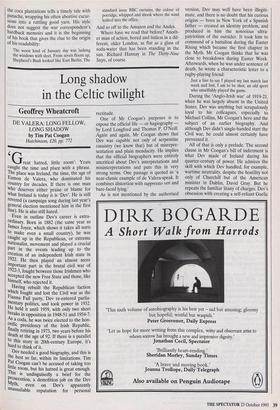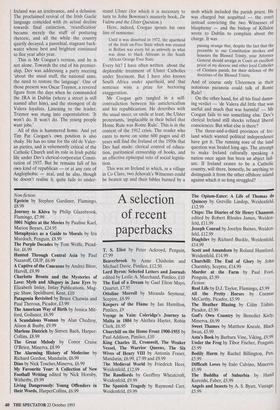Long shadow in the Celtic twilight
Geoffrey Wheatcroft
DE VALERA: LONG FELLOW, LONG SHADOW by Tim Pat Coogan Hutchinson, £20, pp. 772 'Great hatred, little room': Yeats caught the time and place with a phrase. The place was Ireland, the time, the age of Eamon de Valera, who dominated his country for decades. If there is one man who deserves either praise or blame for what Ireland is today it is `Dev'. He is still revered (a campaign song during last year's general election mentioned him in the first line). He is also still hated.
Even in outline Dev's career is extra- ordinary. Born in 1882 (the same year as James Joyce, which shows it takes all sorts to make even a small country), he was caught up in the Republican, or extreme nationalist, movement and played a crucial Part in the events leading up to the creation of an independent Irish state in .1922. He then played an almost more 1111Portant part in the brutal civil war of 1922-3, fought between those Irishmen who accepted the new Free State and those, like himself, who rejected it. Having rebuilt the Republican faction Which fought and lost the Civil war as the Fianna Fail party, Dev re-entered parlia- mentary politics, and took power in 1932. He held it until 1959, with only two short breaks in opposition in 1948-51 and 1954-7. As. a coda, he was twice elected to the, hon- onfic presidency of the Irish Republic, Finally retiring in 1973, two years before his death at the age of 92. If there is a parallel to this story in 20th-century Europe, it's hard to think of it. Dev needed a good biography, and this is the best so far, within its limitations. Tim Pat Coogan can't be accused of taking too little room, but his hatred is great enough. This is undisguisedly a brief for the Prosecution, a demolition job on the Dev MYrh, even on Dev's apparently unassailable reputation for personal rectitude.
One of Mr Coogan's purposes is to expose the official life — or hagiography — by Lord Longford and Thomas F. O'Neill. Again and again, Mr Coogan shows that Dev was capable not only of serpentine casuistry (we knew that) but of misrepre- sentation and plain mendacity. He implies that the official biographers were entirely uncritical about Dev's interpretations and misinterpretations and puts this in very strong terms. One passage is quoted as 'a near-classic example of de Valera-speak. It combines distortion with suppressio yeti and bare-faced lying.' As is not mentioned by the authorised version, Dev may well have been illegiti- mate, and there is no doubt that his curious origins — born in New York of a Spanish father — created an identity problem, and produced in him the notorious ultra- patriotism of the outsider. It took him to command of a battalion during the Easter Rising which became the first chapter in the Myth. Mr Coogan thinks that he was close to breakdown during Easter Week. Afterwards, when he was under sentence of death, he wrote a characteristic letter to a rugby-playing friend:
Just a line to say I played my last match last week and lost, I am to be shot, an old sport who unselfishly played the game.
During the 'Anglo-Irish war' of 1919-21, when he was largely absent in the United States, Dev was anything but scrupulously loyal to his colleagues, especially to Michael Collins, Mr Coogan's hero and the subject of an earlier biography. And although Dev didn't single-handed start the Civil war, he could almost certainly have prevented it.
All of that is only a prelude. The second clause in Mr Coogan's bill of indictment is what Dev made of Ireland during his quarter-century of power. He admires the skill with which Dev handled, for example, wartime neutrality, despite the hostility not only of Churchill but of the American minister in Dublin, David Gray. But he repeats the familiar litany of charges. Dev's obsession with creating a self-reliant Gaelic
Ireland was an irrelevance, and a delusion. The proclaimed revival of the Irish Gaelic language coincided with its actual decline towards final extinction, 'reunification' became merely the stuff of posturing rhetoric, and all the while the country quietly decayed, a parochial, stagnant back- water whose best and brightest continued to flee year after year.
This is Mr Coogan's version, and he is not alone. Towards the end of his premier- ship, Dev was addressing a party meeting `about the usual stuff, the national aims, the need to restore the language'. One of those present was Oscar Traynor, a revered figure from the days when he commanded the IRA in Dublin (where a street is still named after him), and the strongest of de Valera loyalists. Listening to the leader, Traynor was stung into expostulation: 'It won't do. It won't do. The young people want jobs.'
All of this is hammered home. And yet Tim Pat Coogan's own position is also shaky. He has no time for the old de Valer- an pieties, and is vehemently critical of the Catholic Church and its role in Irish public life under Dev's clerical-corporatist Consti- tution of 1937. But he remains full of his own kind of republican - or at any rate of Anglophobic - zeal, and he also, though he doesn't realise it, quite fails to under- stand Ulster (for which it is necessary to turn to John Bowman's masterly book, De Valera and the Ulster Question.)
Here, indeed, Coogan spouts his own line of nonsense:
Until it was dissolved in 1972, the apartheid of the Irish un-Free State which was created in Belfast was every bit as unlovely as what was done to black Africans in the South African Orange Free State.
Every bit? I have often written about the deplorable treatment of Ulster Catholics under Stormont. But I have also known South Africa under apartheid, and that sentence wins a prize for hectoring exaggeration.
Mr Coogan gets tangled in a self- contradiction between his anticlericalism and his republicanism. He describes with the usual sneer, or smile at least, the Ulster protestants, 'implacable in their belief that Home Rule was Rome Rule'. This is in the context of the 1912 crisis. The reader who cares to move on some 600 pages and 45 years will find the Ireland of the 1950s that Dev had made: clerical control of educa- tion, puritanical censorship of books, and an effective episcopal veto of social legisla- tion.
This was an Ireland in which, in a village in Co Clare, two Jehovah's Witnesses could be beaten up and their bibles burned by a
mob which included the parish priest. He was charged but acquitted - the court instead convicting the two Witnesses of blasphemy - and the bishop of Killaloe wrote to Dublin to complain about the charge. It was
passing strange that, despite the fact that the preamble to our Constitution invokes and honours the Blessed Trinity, your Attorney General should arraign in Court an excellent priest of my diocese and other loyal Catholics of Clonlara parish, for their defence of the doctrines of the Blessed Trinity.
And of course only Ulstermen in their notorious paranoia could talk of Rome Rule!
On the other hand, for all his final damn- ing verdict - 'de Valera did little that was useful and much that was harmful' - Mr Coogan fails to see something else. Dev's clerical Ireland still shocks refined liberal consciences. But what else is there?
The three-and-a-third provinces of Ire- land which wanted political independence have got it. The running sore of the land question was healed long ago. The attempt to make Ireland culturally speaking a nation once again has been an abject fail- ure. If Ireland ceases to be a Catholic country, will there, honestly, be anything to distinguish it from the other offshore island against which it so long struggled?



































































 Previous page
Previous page